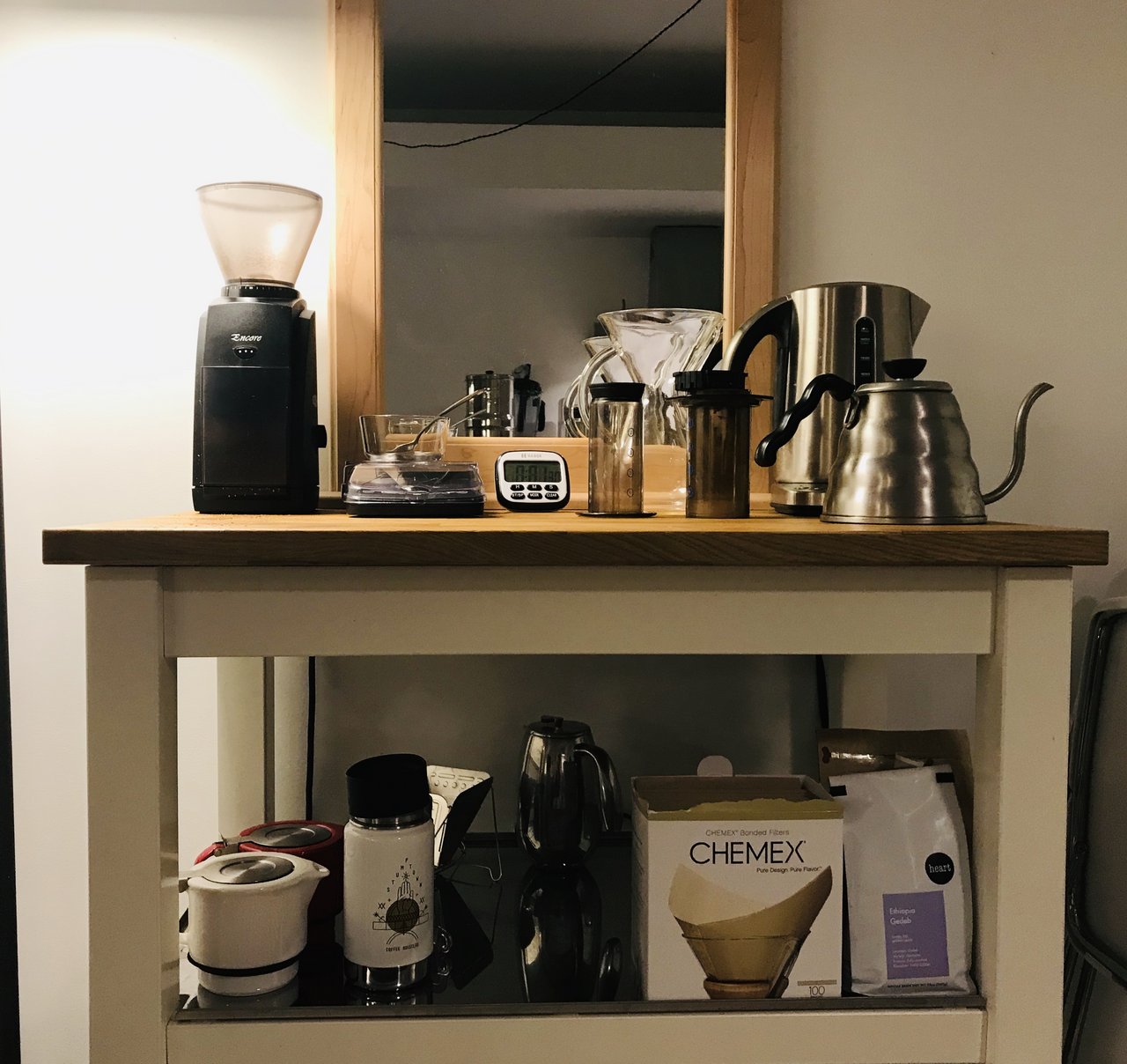How I prepare coffee at home
I love coffee, and living in the Pacific Northwest means I drink a lot of it. Over the years I've perfected my home brewing methods and love the ritual of making a delicious cup each morning. Although there are plenty of tutorials on how to make a great cup of coffee, I thought I'd share with you how I like to make mine. (Photo below is my home coffee bar.)

My favorite beans
Coffee sourced from Ethiopia tends to be my favorite. Ethiopian coffees tend to be fruitier and brighter than other coffees. To me, they have the most pronounced flavor profile. Of course, that's a personal preference and I encourage you to find the beans you like.
Here in Portland, we're spoiled with amazing coffee roasters all over town. My favorite roasters are Heart and Coava.
Coffee for one: Aeropress
The Aeropress is my favorite way to brew a single cup of coffee. Because of its unique vacuum brew method, it's fast and easy to clean up afterwards.
To start, I weigh out 16g of beans and dump them in the hopper of my Barazta Encore grinder. I use a fine-medium grind at approximately the '10' setting on the Encore grinder.
Then, I heat 500ml water to a boil. While it's boiling, I place the Aeropress base atop a plain white mug I bought for a dollar at a thrift store in Eugene a couple years back.
Once the water is heated, I flip the switch on the grinder and pour a splash of hot water into the Aeropress to heat the mug. This is important to make sure your coffee maintains temperature as soon as it hits your mug!
Once the coffee is ground, I turn off the grinder, dump the water in the mug down the sink, and dump the ground coffee into the Aeropress. I fill the Aeropress to the '4' line with water, gently agitating the grounds. Then, I use the Aeropress stirrer to stir the mixture gently for about 10 seconds.
Once the mixture is stirred, I wedge the Aeropress plunger inside the base, and pull up to create suction so the coffee stays in the Aeropress for the duration of the brew. I have a timer preset to 1m30s on my coffee bar so I can press the 'Start' button without setting the timer.
After 1m30s have passed, I plunge the plunger and force the sweet, sweet coffee nectar into the mug.
Coffee for two: Chemex
When my girlfriend is staying over, I like to jolt out of bed and prepare us a batch of coffee from my Chemex.
First, I weigh out 42g of beans and dump them in the grinder hopper. I use a medium grind at approximately the '15' setting on the Encore grinder.
Then, I heat a full gooseneck kettle of water. While it's boiling, I place the Chemex on top of my kitchen scale (I use the Jennings CJ-4000) with a square Chemex paper filter opened and the "folded" side toward the spout.
After the water is heated, I pour boiling water all over the filter. This both removes the papery taste from the filter, as well as heats the Chemex to provide a better brew. In addition, I also pour a splash of water in our two mugs to heat them as well.
Once the water has found its way through the filter and into the base of the Chemex, I turn on the grinder and dump the water in the sink.
After pouring the ground coffee into the now-wet paper filter, I begin the bloom process. I slowly pour water from the outside of the grounds inward in concentric circles, trying to only hit the dry grounds with the stream of water. Once I've poured about 100g of water into the Chemex, I pause to let the coffee "bloom". After a few seconds, I stir the mixture carefully with a spoon.
Finally, I continue pouring water in, trying to hit the darkest spots with the stream. If there are no dark spots, I usually aim for the center, letting the Chemex fill until I've poured 700g of water. Once I have, I turn off the scale and let the brew run its course.
After the dripping has stopped, I dump the used filter, swirl the coffee a bit to make sure it's even, and pour it evenly into each mug. The 42g grounds to 700g water ratio should yield about two mugs of coffee.
I hope this inspires you to prepare your own delicious cup of coffee at home!